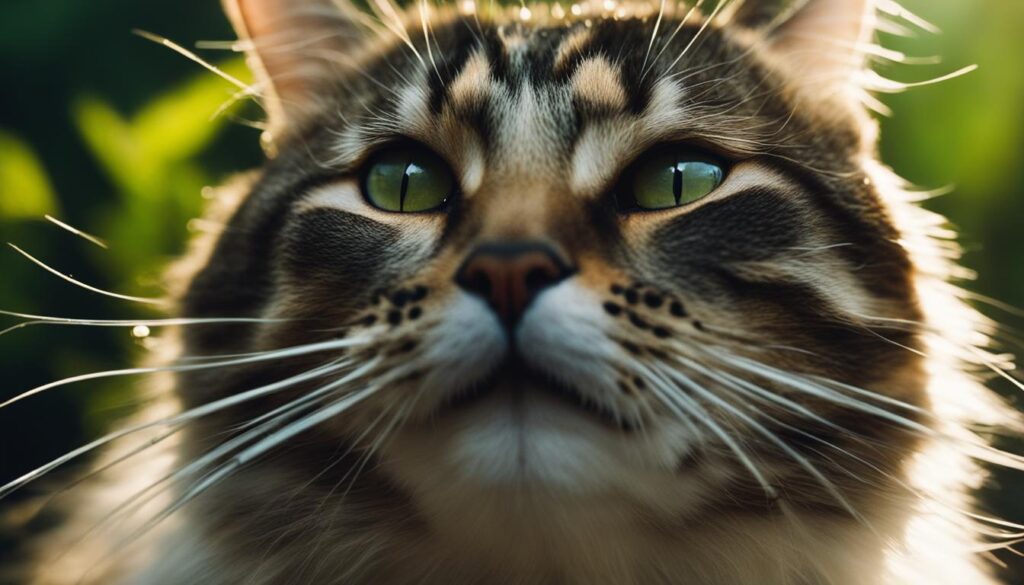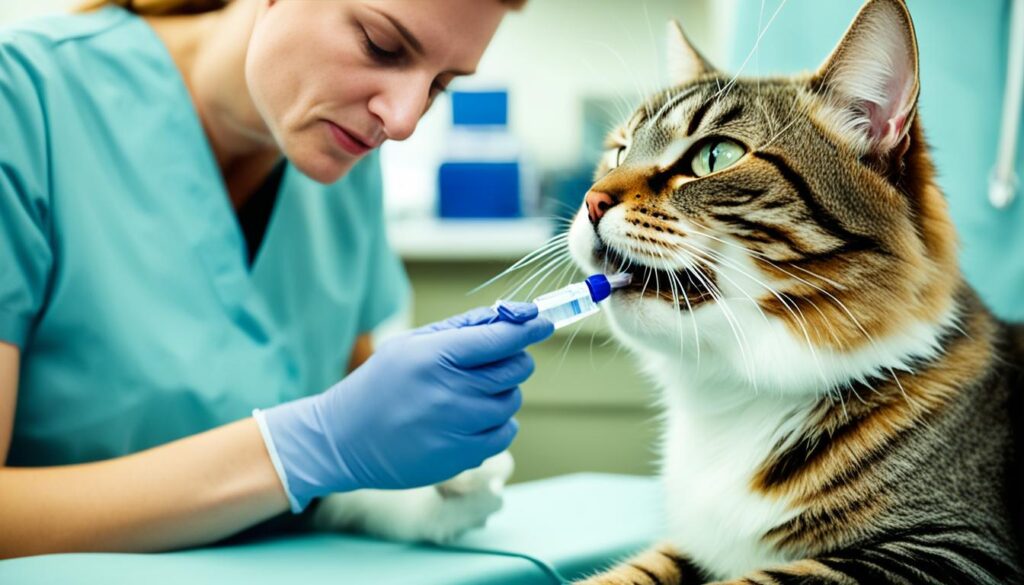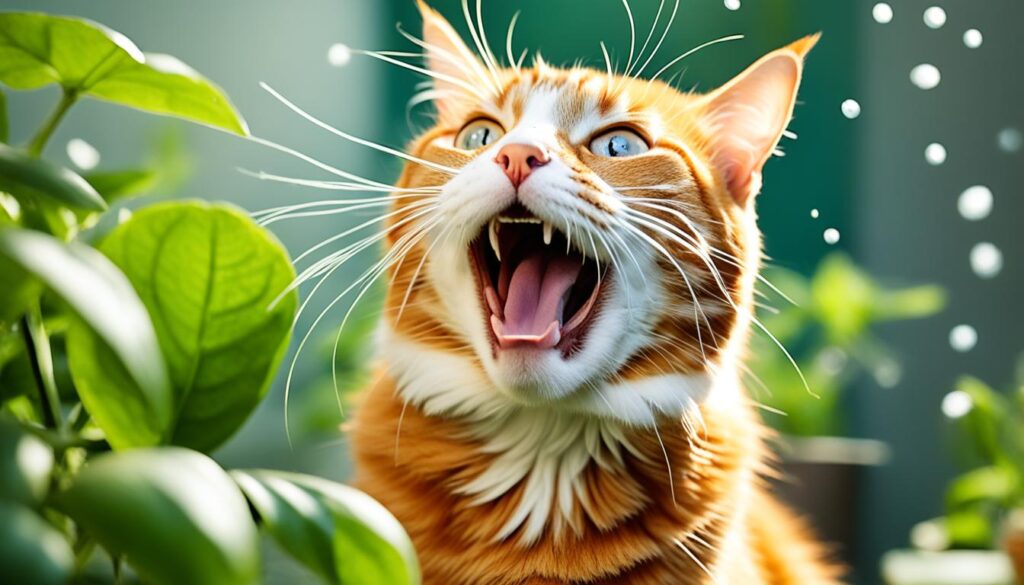Picture this: you’re sitting on your couch, enjoying a quiet evening at home. Suddenly, you hear a familiar soundâa gentle sneeze. You look around, trying to pinpoint the source, and there it is: your beloved cat, sneezing away with a puzzled look on their face. As a pet owner, this can be a cause for concern. You wonder, why is my cat sneezing?
Cat sneezing can be a perplexing issue, as there are numerous factors that can contribute to it. From allergies to respiratory infections, there are various reasons why your feline friend might be sneezing. Understanding these common causes is essential in order to provide the best care for your cat.
Key Takeaways:
- When your cat sneezes, it’s important to investigate the potential causes.
- Allergies, respiratory infections, environmental triggers, and nasal tumors are among the common culprits.
- Persistent sneezing, watery eyes, and blood in the sneeze can be signs of more serious conditions.
- If you’re unsure about the cause of your cat’s sneezing or if their condition worsens, consult a veterinarian.
- Home remedies and preventive measures may help alleviate sneezing, but always consult with a vet before trying them.
Allergies: A Common Culprit for Cat Sneezing
When your cat starts sneezing, one of the most common causes to consider is allergies. Yes, just like humans, cats can also develop allergies to various substances in their environment. These allergies can trigger sneezing and other uncomfortable symptoms in your feline friend.
Allergies in cats can be caused by different irritants, such as pollen, dust mites, certain foods, or even specific types of cat litter. When exposed to these allergens, your cat’s immune system overreacts, leading to symptoms like sneezing, itching, and excessive grooming.
If you suspect that your cat’s sneezing is due to allergies, there are a few signs to look out for. Keep an eye on your cat’s behavior and observe if they have any of the following symptoms:
- Repeated bouts of sneezing
- Itchy or watery eyes
- Runny nose
- Skin irritation or excessive scratching
It’s important to note that allergies can develop at any age. Your cat may have been exposed to an allergen for a while before showing any symptoms. If you suspect allergies as the cause of your cat’s sneezing, it’s best to consult with a veterinarian for a proper diagnosis.
“Allergies in cats can be caused by different irritants, such as pollen, dust mites, certain foods, or even specific types of cat litter.”
Treatment for allergic sneezing in cats may involve various aspects, depending on the severity of the allergies. Your veterinarian may recommend:
- Environmental modifications: Identifying and minimizing exposure to allergens in your cat’s surroundings.
- Medications: Antihistamines or corticosteroids to alleviate symptoms and reduce inflammation.
- Allergy testing: Identifying specific allergens through allergy testing, which can help in formulating an appropriate treatment plan.
- Immunotherapy: In severe cases, your veterinarian may recommend allergy shots to desensitize your cat’s immune system.
It’s vital to understand that home remedies or over-the-counter medications should never be used without proper veterinary guidance. Some human medications can be harmful to cats, and self-diagnosing your cat’s allergies can lead to ineffective treatment.
Prevention is Key
While it may not always be possible to completely prevent allergies in cats, there are steps you can take to minimize the risk of exposure to known allergens:
- Keep your home clean and free from dust mites by regular vacuuming and dusting.
- Use unscented, hypoallergenic cat litter.
- Avoid exposure to strong fragrances, such as perfumes and air fresheners.
- Ensure proper ventilation and clean air filters in your home.
| Allergy Symptoms | Possible Treatment Options |
|---|---|
| Repeated sneezing | Environmental modifications Medications Allergy testing |
| Watery or itchy eyes | Medications Allergy testing Immunotherapy (in severe cases) |
| Runny nose | Environmental modifications Medications |
| Excessive scratching or skin irritation | Environmental modifications Medications |
Respiratory Infections: when Sneezing Becomes More Than Colds
Respiratory infections can be a common cause of sneezing in cats, and it’s important to understand how they can manifest and affect your feline friend’s health. Two common respiratory infections that may cause sneezing in cats are the feline herpesvirus and calicivirus.
The feline herpesvirus is highly contagious among cats and can cause a range of symptoms, including sneezing, coughing, and a runny nose. Cats with this virus may also experience conjunctivitis, fever, and loss of appetite. It’s important to note that although the symptoms may resemble a common cold, they can be more severe in some cases.
The calicivirus is another common respiratory infection in cats that can lead to sneezing and coughing. Along with these symptoms, cats infected with calicivirus may also develop oral ulcers, fever, and joint pain. In severe cases, this infection can cause pneumonia and more serious respiratory complications.
These respiratory infections are highly contagious among cats and can spread through direct contact with an infected cat or through shared objects, such as food bowls or litter boxes. Proper hygiene practices, such as regularly cleaning and disinfecting your cat’s belongings, can help reduce the risk of transmission.
Symptoms of Respiratory Infections in Cats
Respiratory infections can manifest with various symptoms in cats, including:
- Sneezing
- Coughing
- Runny nose
- Watery or irritated eyes
- Fever
- Loss of appetite
- Lethargy
If your cat is experiencing these symptoms, it is important to consult a veterinarian for an accurate diagnosis and appropriate treatment.
Treatment Options for Respiratory Infections
While there is no cure for viral respiratory infections in cats, treatment is focused on managing the symptoms and supporting the cat’s immune system. Your veterinarian may prescribe antiviral medications, antibiotics to prevent secondary bacterial infections, and medications to help with congestion and inflammation.
In severe cases, hospitalization and supportive care, such as IV fluids and nebulization, may be necessary to ensure your cat’s well-being. It is crucial to follow your veterinarian’s recommendations and complete the full course of treatment to minimize the risk of complications and aid in your cat’s recovery.
| Pros | Cons |
|---|---|
| Effective in managing symptoms | No cure for viral infections |
| Helps prevent secondary bacterial infections | May require long-term management for chronic cases |
| Supports the immune system | Can be costly, especially with hospitalization |
Respiratory infections in cats can be challenging to manage, but with proper care and treatment, most cats can recover successfully. It is crucial to monitor your cat’s condition closely and seek veterinary care if the symptoms worsen or do not improve over time.
Environmental Triggers: Sneezing due to Irritants
Sneezing in cats can be attributed to various factors, including environmental irritants. These irritants can cause your cat’s immune system to react, leading to frequent sneezing bouts. Identifying and eliminating these triggers can help alleviate your cat’s discomfort and reduce sneezing episodes.
Some common environmental triggers that may cause sneezing in cats include:
- Strong perfumes or fragrances
- Cigarette smoke
- Chemicals or cleaning products
- Dust or pollen
These irritants can irritate your cat’s nasal passages, leading to sneezing. Observing your cat’s behavior and environment can help you pinpoint potential triggers. If your cat sneezes excessively after you use a certain cleaning product, for example, that may be the cause.
To eliminate these triggers and reduce your cat’s sneezing, consider taking the following steps:
- Avoid using strong perfumes or fragrances
- Keep your cat away from cigarette smoke
- Use pet-friendly, non-toxic cleaning products
- Regularly clean and dust your home
By creating a clean and irritant-free environment, you can help alleviate your cat’s sneezing and improve their overall health and well-being.
| Environmental Triggers | Effects on Cats |
|---|---|
| Strong perfumes or fragrances | Irritates the nasal passages, leading to sneezing |
| Cigarette smoke | Causes respiratory irritation and sneezing |
| Chemicals or cleaning products | Triggers allergic reactions and sneezing |
| Dust or pollen | Irritates the respiratory system and induces sneezing |
Upper Respiratory Infections: Persistent Sneezing and Watery Eyes
Some upper respiratory infections in cats can cause persistent sneezing that is accompanied by watery eyes. These infections can be quite uncomfortable for your furry friend and may require proper treatment to provide relief.
One common upper respiratory infection in cats is feline viral rhinotracheitis. It is caused by the feline herpesvirus and can result in prolonged bouts of sneezing as well as watery eyes. Another common infection is feline calicivirus, which can also lead to persistent sneezing and eye discharge.
If your cat is experiencing these symptoms, it is essential to consult with a veterinarian for an accurate diagnosis and appropriate treatment. The veterinarian may recommend antiviral medications to manage the viral infection and alleviate the sneezing and watery eyes.
Additionally, supportive care measures can be helpful in easing your cat’s discomfort. Keeping your cat’s eyes clean and moist with a veterinarian-recommended eye rinse can help relieve the irritation. This can be done using a soft cloth or cotton ball dampened with the eye rinse solution.
In severe cases, where the infection has caused complications such as secondary bacterial infections, the veterinarian may prescribe antibiotics to combat the bacterial component. The right treatment approach will depend on the specific diagnosis made by the veterinarian.

| Common Upper Respiratory Infections in Cats | Symptoms | Treatment |
|---|---|---|
| Feline viral rhinotracheitis (caused by feline herpesvirus) | Persistent sneezing, watery eyes, nasal discharge | Antiviral medications, supportive care |
| Feline calicivirus | Persistent sneezing, watery eyes, oral ulcers | Antiviral medications, supportive care |
Nasal Tumors: A Rare but Serious Cause of Sneezing
While sneezing in cats is often a common occurrence and usually not a cause for concern, in rare cases, it can be a symptom of a more serious underlying condition. One such condition is nasal tumors.
What are Nasal Tumors?
Nasal tumors are abnormal growths that develop in the nasal cavity of cats, causing various symptoms, including excessive cat sneezing and even the presence of blood in the sneeze. These tumors can be benign (non-cancerous) or malignant (cancerous).
Signs and Differentiation From Other Causes
It is crucial to recognize the signs of a possible nasal tumor and differentiate them from other causes of sneezing. Some common signs include:
1. Chronic and persistent sneezing that worsens over time.
2. Blood in the sneeze or nasal discharge.
3. Difficulty breathing through the nose.
4. Nasal congestion.
5. Swelling or deformity in the face.
If you notice any of these signs in your cat, it is essential to consult a veterinarian for a thorough examination and proper diagnosis. Other causes of sneezing, such as allergies or respiratory infections, should be ruled out before considering the possibility of a nasal tumor.
Treatment and Prognosis
The treatment options for nasal tumors depend on their type and stage. Some cases may require surgical removal of the tumor, while others may involve chemotherapy or radiation therapy. Unfortunately, due to the nature of these tumors, the prognosis can vary, and long-term survival may not always be possible.
Early detection plays a crucial role in the management of nasal tumors.
| Treatment Options | Advantages | Disadvantages |
|---|---|---|
| Surgical Removal | – Can potentially remove the tumor completely – May provide long-term relief | – Requires anesthesia and may pose risks – Not always possible, depending on the tumor’s location and size |
| Chemotherapy | – Can help shrink tumors before surgery – May slow down tumor growth | – Side effects and potential toxicity – May not be effective in all cases |
| Radiation Therapy | – Can help control tumor growth and alleviate symptoms – Non-invasive treatment option | – Requires multiple treatment sessions – Potential side effects and complications |
Remember, nasal tumors in cats are rare, but their impact can be severe. If you suspect your cat may have a nasal tumor, it is important to seek veterinary care promptly for proper diagnosis and treatment options.
When to Seek Veterinary Care: Understanding Red Flags
While occasional sneezing is usually not a cause for concern, it’s important to be aware of the red flags that may indicate a need for veterinary care. If you notice any of the following signs, it’s time to consult a veterinarian for proper diagnosis and treatment:
- Persistent or frequent sneezing: If your cat is sneezing frequently, or if sneezing persists for more than a few days, it may indicate an underlying issue that requires attention.
- Difficulty breathing: Labored breathing, wheezing, or any signs of respiratory distress should be taken seriously and addressed by a veterinarian as soon as possible.
- Change in appetite or weight loss: Sneezing accompanied by a decreased appetite or unexplained weight loss can be a sign of a more serious underlying condition.
- Discharge from the eyes or nose: If your cat has yellow or green discharge from their eyes or nose, it might indicate an infection that requires medical intervention.
- Behavioral changes: Any sudden changes in behavior, such as lethargy, hiding, or a decrease in activity level, should not be ignored as they may indicate an underlying health issue.
If you observe any of these red flags, it’s best to schedule an appointment with a veterinarian. They will be able to conduct a thorough examination, perform any necessary tests, and recommend appropriate treatment options to address your cat’s sneezing and any associated symptoms.

In the next section, we will explore home remedies and preventive measures to help alleviate your cat’s sneezing.
Home Remedies and Preventive Measures for Cat Sneezing
If your cat is experiencing sneezing episodes, there are some home remedies that you can try to help alleviate their symptoms. However, it’s always important to consult with your veterinarian before attempting any remedies, as they can provide guidance based on your cat’s specific needs.
1. Maintain a Clean Environment
Regularly cleaning your cat’s living environment can help reduce the presence of irritants that may trigger sneezing. Vacuuming carpets, dusting surfaces, and changing air filters can help minimize dust, pollen, and other allergens.
2. Use a Humidifier
In dry climates or during the winter months, using a humidifier can help add moisture to the air and prevent dry nasal passages, which can contribute to sneezing. Be sure to clean and maintain the humidifier properly to avoid the growth of bacteria or mold.
3. Provide Proper Nutrition
A balanced diet plays a crucial role in your cat’s overall health, including their immune system. Ensure that your cat is receiving high-quality food that supports their immune system and provides essential nutrients. Consult with your veterinarian for specific dietary recommendations.
4. Natural Remedies
Some natural remedies may help soothe your cat’s sneezing symptoms. These include saline nasal drops, herbal supplements like echinacea or goldenseal (only under veterinary guidance), and steam inhalation (using a steamer in a closed bathroom while sitting with your cat).
5. Reduce Stress
Stress can weaken your cat’s immune system and make them more susceptible to sneezing and other health issues. Provide a calm and comfortable environment for your cat, and engage in activities that help reduce their stress levels, such as interactive playtime and providing hiding spots.
6. Regular Veterinary Check-ups
Regular visits to the veterinarian are essential for maintaining your cat’s health. Your veterinarian can identify any underlying causes of your cat’s sneezing, provide appropriate treatment, and offer advice on preventive measures.
Remember, while these home remedies can provide relief for your cat’s sneezing, it’s crucial to involve your veterinarian in the decision-making process and follow their guidance for the best possible care.
| Remember: | Avoid: |
|---|---|
|
|
Conclusion
By understanding the common causes of cat sneezing and knowing when to seek veterinary care, you can provide the necessary support and treatment for your feline friend. Sneezing in cats can be a result of various factors, including allergies, respiratory infections, environmental triggers, upper respiratory infections, and even nasal tumors.
When your cat is sneezing, it’s important to observe their overall behavior and look out for other symptoms such as coughing, a runny nose, or watery eyes. While occasional sneezing is usually not a cause for concern, persistent or severe sneezing accompanied by other symptoms may indicate an underlying health issue that requires veterinary attention.
Remember that each cat is unique, and if you have any concerns about your cat’s health, it’s always best to consult with a veterinarian for personalized advice and guidance. They can provide a proper diagnosis, recommend appropriate treatment options, and help you implement preventive measures to minimize future sneezing episodes.
FAQ
Why is my cat sneezing?
Sneezing in cats can be caused by various factors such as allergies, respiratory infections, environmental irritants, upper respiratory infections, nasal tumors, or even normal situations like dust or foreign objects in the nasal passages.
Are allergies a common cause of cat sneezing?
Yes, allergies are a frequent cause of sneezing in cats. They can develop allergic reactions to substances like pollen, dust mites, or even certain types of cat litter. Identifying the allergen and managing exposure can help reduce sneezing episodes.
Can respiratory infections lead to sneezing in cats?
Yes, respiratory infections, such as feline herpesvirus or calicivirus, can cause sneezing along with symptoms like coughing and a runny nose. Proper diagnosis and treatment by a veterinarian are essential for managing these infections.
What are some environmental triggers that can cause sneezing in cats?
Cats can be sensitive to irritants in their environment, including strong perfumes, cigarette smoke, or certain chemicals. Identifying and eliminating these triggers can help reduce sneezing episodes in cats.
Why do some upper respiratory infections in cats cause sneezing and watery eyes?
Some upper respiratory infections in cats can manifest as persistent sneezing accompanied by watery eyes. Feline herpesvirus and calicivirus are common culprits. Treatment options may include antiviral medications and supportive care.
Can nasal tumors be a cause of sneezing in cats?
Yes, although rare, nasal tumors can be a serious underlying cause of sneezing in cats. Signs of a possible tumor include persistent or bloody sneezing. Early detection and proper treatment are crucial in such cases.
When should I seek veterinary care for my cat’s sneezing?
While occasional sneezing is usually not concerning, it’s important to watch out for red flags such as persistent sneezing, difficulty breathing, nasal discharge, or any other concerning symptoms. Consult a veterinarian for proper diagnosis and treatment.
Are there any home remedies or preventive measures for cat sneezing?
There are some home remedies that may help alleviate cat sneezing, such as steam therapy or using a humidifier. However, it’s important to consult with a veterinarian first. Preventive measures include keeping the environment clean and free from potential irritants.
What should I do if I’m concerned about my cat’s sneezing?
If you have any concerns about your cat’s health, it’s always best to consult with a veterinarian for personalized advice and guidance. They can assess your cat’s symptoms, perform necessary tests, and recommend appropriate treatment options.



